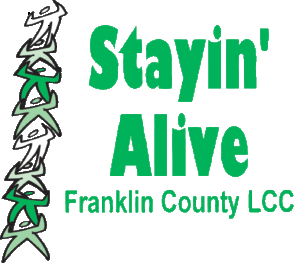The Franklin County Local Coordinating Council (LCC), Stayin’ Alive, was established in 1990 in response to the creation of the Governor’s Commission for a Drug-Free Indiana. The goal was to develop local coalitions in all of the 92 counties in the State of Indiana to assess and address local substance abuse issues.
Stayin’ Alive is a group of concerned citizens and community leaders who have come together to form a partnership between the private and public sectors of Franklin County in order to increase the awareness of substance abuse throughout our county. We also educate all citizens in the community about this issue and the effects it causes.
What does Stayin’ Alive do?
- Allows Franklin County residents to address important issues that affect quality of life.
- Empowers and mobilizes citizens to have a say in local efforts to reduce alcohol, tobacco and other drug problems in the county.
- Minimizes duplication of efforts so that time is efficiently spent addressing alcohol, tobacco and other drug issues.
Problems Addressed by Stayin’ Alive:
- Community norms support casual, accepting and enabling attitudes toward misuse of alcohol.
- Substance misuse and abuse by visitors to the community continues to have a negative impact on the quality of life in Franklin County.
- There continues to be a need for additional treatment services and ongoing awareness of available treatment options and effectiveness of the treatment options in the community.
Stayin’ Alive is responsible for:
- Developing a Comprehensive Community Plan.
- Awarding grants addressing alcohol, tobacco and other drug (ATOD) issues in Franklin County in the areas of prevention and education, law enforcement and justice, and treatment and intervention.
- Having a positive influence on our community’s economy.
Distribution of Fund
The Governor’s Commission for a Drug-Free Indiana has designated a Local Coordinating Council in every county within the state. These LCCs are responsible for overseeing the allocations of the Drug Free Communities Fund. At least 25% of the funds must go towards each of the following areas: prevention/education, law enforcement/criminal justice and intervention/treatment.
Countermeasure Fees
The Drug Free Communities funds are collected from local dollars through the following offender fees:
- A drug abuse, prosecution, interdiction and correction fee of at least $200 and not more than $1,000 assessed against a person convicted of drug offense. Those would include dealing, manufacturing and/or possessing.
- An alcohol and drug countermeasures fee of $200 assessed from any alcohol or drug related offense, including driving under the influence, minor possession of alcohol, possession of marijuana or other drugs.

